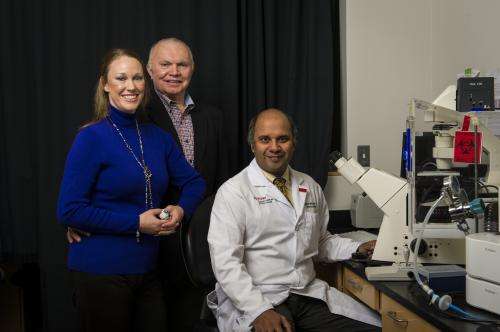Personalizing cancer treatments for the youngest of patients

The aim of personalizing cancer treatments by targeting genomic mutations in the cancer has seen rapid advances in recent years. Many of these targeted cancer therapies, however, have been more frequently identified for adult patients. Recognizing a need to further explore genomic profiling in pediatric malignancies, the Hugs for Brady Foundation has committed $300,000 to the precision medicine initiative at Rutgers Cancer Institute of New Jersey.
"Precision medicine constitutes a different method of identifying best treatment options for patients. Instead of prescribing therapy based solely on the organ where the cancer originated, clinicians utilize genomic analysis for a more comprehensive approach. Through a rapid gene sequencing test, the tiniest details of a tumor biopsy are uncovered, sometimes revealing one or more mutations in the patient's genes. It is the mutations themselves that can be targeted with new or existing drugs.
At the Cancer Institute of New Jersey, a team of physician-scientists, bioinformatics specialists, systems biologists, pathologists and a host of others meets weekly to discuss profiling results and determine therapy options. Currently, a genomic analysis clinical trial at the Cancer Institute is focused on those patients with rare or poor-prognosis cancers, including pediatric patients. It is the youngest of patients that Sherrie and Michael Wells, founders of Hugs for Brady, have focused their efforts and are hoping to help with their gift.
"The Kendall Park couple is no stranger to the work being done and care being provided at the Cancer Institute. Their son Brady Michael was treated there for acute undifferentiated leukemia before his passing in 2010, a few weeks shy of his second birthday. It was shortly after that they created the foundation with an aim of comforting children faced with cancer and providing resources to advance research in pediatric cancers and blood disorders.

Demonstrating its commitment to research, last year the foundation established the Hugs for Brady Foundation Pediatric Young Investigator Award at the Cancer Institute. The purpose of the two-year grant is to foster the early career development of promising young scientists while they pursue innovative pediatric cancer research.
While pediatric cancer survivor rates are generally high, there are those children – like Brady – who unfortunately lose their fight due to rare forms of the disease. Hugs for Brady is committed to helping scientists further unlock the mysteries of rare pediatric cancers. By supporting the cutting-edge research and expert analysis being conducted through the precision medicine initiative at Rutgers Cancer Institute of New Jersey, we are moving closer to a cure," said Sherrie Wells.
"Recent research shows that more potential targets are being identified through genomic analysis for pediatric cancers. The commitment put forth by Hugs for Brady will help Cancer Institute investigators further build on those findings so that optimal treatments can be found for these young patients," said Shridar Ganesan, associate director for translational science at the Cancer Institute, who is the lead investigator of the genomic analysis trial and an associate professor of medicine and pharmacology at Rutgers Robert Wood Johnson Medical School. "We are grateful to the Hugs for Brady Foundation for its continued dedication to the fight against pediatric cancer."














